The Tokyo Foundation will be closed for the yearend and New Year holidays from December 29, 2017, to January 3, 2018.
We will resume our operations on January 4.
We wish all of you a very Happy New Year!


December 28, 2017
The Tokyo Foundation will be closed for the yearend and New Year holidays from December 29, 2017, to January 3, 2018.
We will resume our operations on January 4.
We wish all of you a very Happy New Year!


December 20, 2017
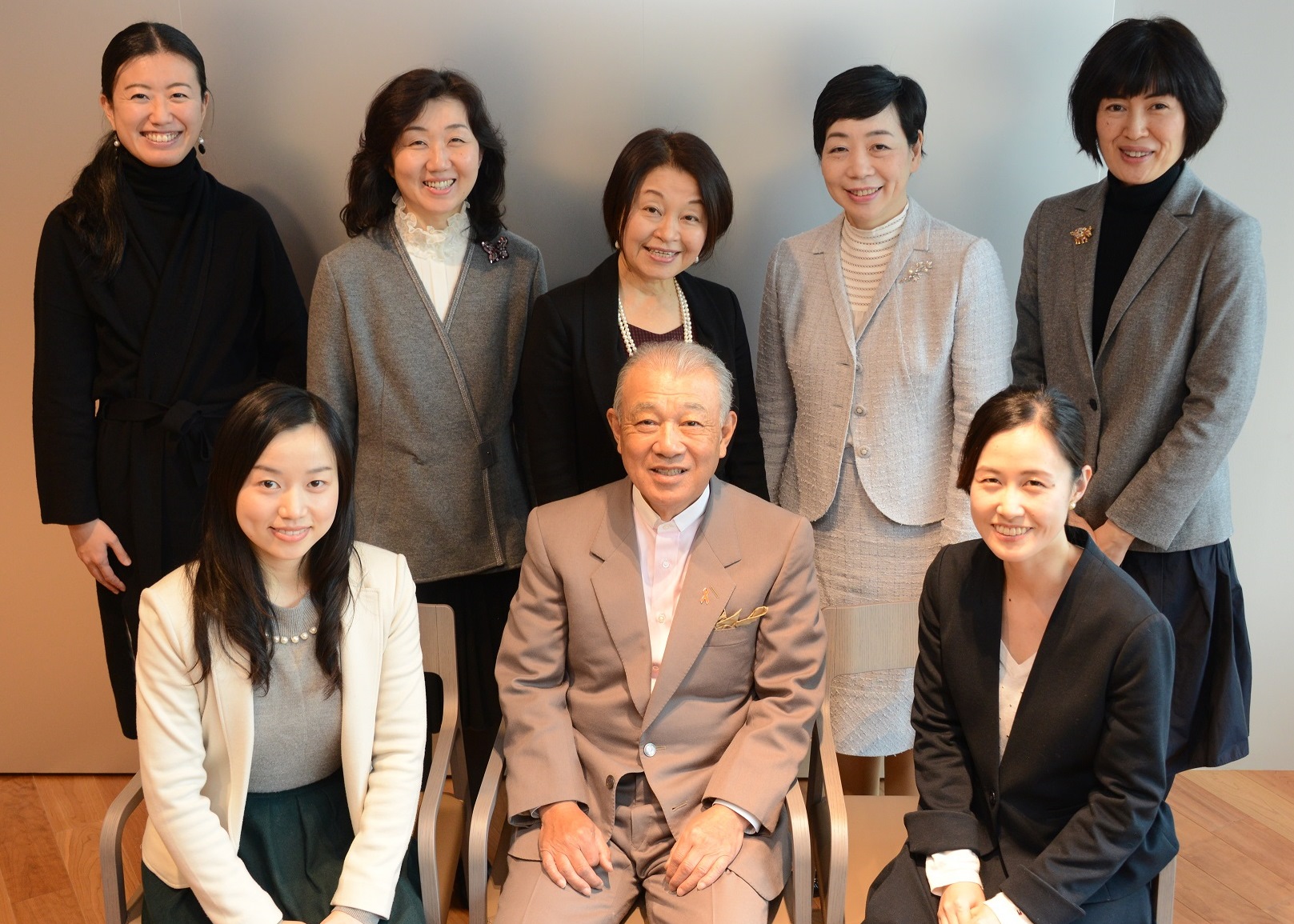
Sylff Association Chairman Yohei Sasakawa (seated, center) is flanked by Yue Zhang (left) and Aya Oyamada. Standing, from left, are Aya Fukuda, Yumi Arai, Mari Suzuki (director), Sanae Oda (executive director), and Tomoko Yamada.
The year 2017 was a special and exciting one for us, highlighted by the April launch of the Sylff Association in commemoration of Sylff’s 30th anniversary. The move, aimed at bringing closer together all stakeholders in the Sylff community, has generated many positive developments, including a redesigned, user-friendly website; new support programs to promote career advancement and social action; and relief initiatives spearheaded by fellows to pool the Sylff community’s resources in the wake of major disasters.
Befitting our new role as the Association secretariat, the Tokyo Foundation moved to a brand new, 34th-floor office in October with a breathtaking view of Tokyo (and beyond!). The following is a summary of the year’s major developments.
Sylff Support Programs
The launch of the Sylff Association has been accompanied by expanded opportunities for support after the fellowship period. Two new support programs were announced in September—Local Association Networking Support(LANS) and Sylff Project Grant(SPG)—and a third, called Sylff Disaster Relief, was launched as an outgrowth of the Colmex earthquake relief campaign in October. As for the two existing programs, seven fellows received Sylff Leadership Initiatives awards in 2017, and 25 received Sylff Research Abroad grants.
We will soon be introducing yet another program. Please be sure to visit the Sylff website to keep up-to-date on our latest initiatives. We look forward to receiving many applications in 2018.
Sylff Worldwide
On May 17, Jagiellonian University celebrated the 25th anniversary of its Sylff program. Sylff Association Chairman Yohei Sasakawa attended the ceremony and made a congratulatory speech.
Sylff Administrators Meeting in China
A meeting of Chinese Sylff administrators was held on July 3, hosted by Jilin University. Some 25 people from all 10 Sylff universities in China (Fudan, Jilin, Lanzhou, Nanjing, Peking, Chongqing, Inner Mongolia, Xinjiang, Yunnan, and Sun Yat-sen) gathered to discuss ways to enhance the value of the Sylff program in China.
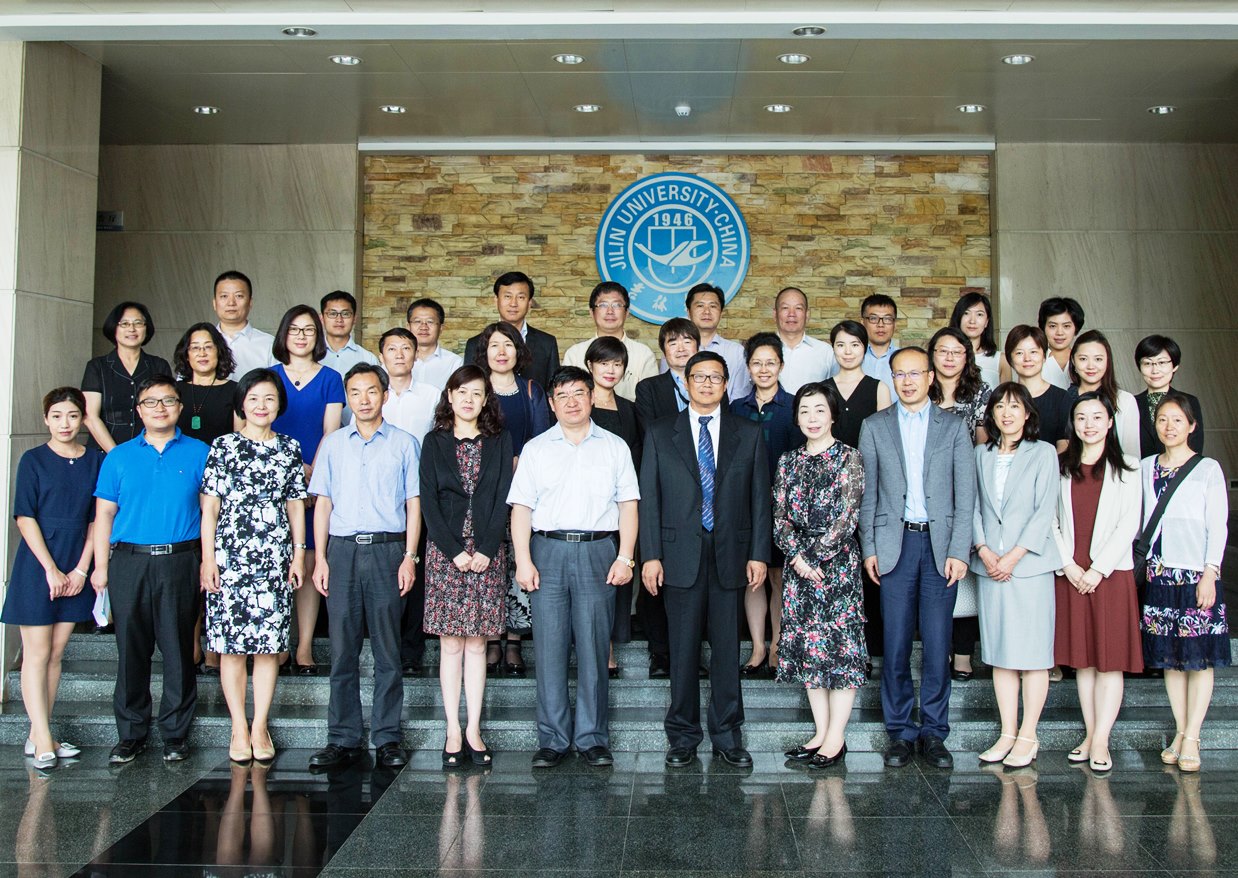
We are pleased to announce that the National Academy of Governance (Mongolia) and the University of Music and Performing Arts Vienna (Austria) have signed agreements to join the new financial scheme. Twelve institutions operate the Sylff program under the new scheme as of December 2017. In 2018, several more institutions will be joining, including the Graduate Institute of International and Development Studies (Switzerland).
Sylff Colmex Earthquake Relief Fund
The Sylff Association secretariat announced a fundraising campaign between September 29 and October 31 to support fellows at Colmex (El Colegio de México) who were working to help the victims of the September 19 Mexico earthquake. Thank you for your interest and donations. A report on how the funds were used will be published on the Sylff website.
Sylff@Tokyo
We welcomed many current and graduated fellows, Sylff steering committee members, and other friends to the Sylff Association secretariat office in 2017.
Dec 14, 2017
Sylff@Tokyo: Colmex President and Professor Visit Our Office
Dec 14, 2017
Sylff@Tokyo: Colmex Fellow Promoting Mexico-Asia Exchange
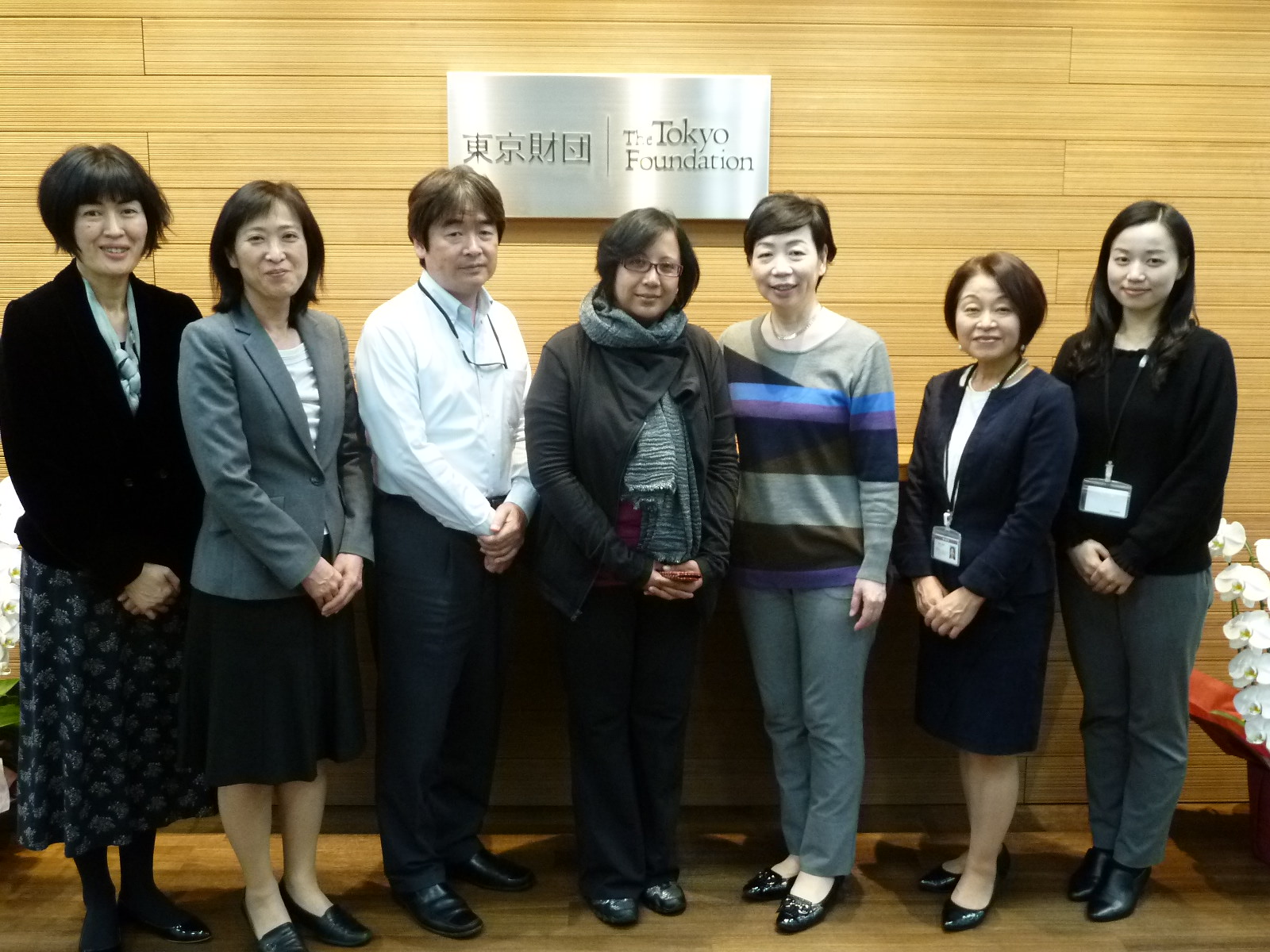
From left, Tomoko Yamada, Yoko Kaburagi (director), Keita Sugai, Adriana Rojas Martinez, Sanae Oda (executive director), Mari Suzuki (director), and Yue Zhang.
Nov 15, 2017
Sylff@Tokyo: First Sylff Visitor to Our New Office
Aug 22, 2017
Sylff@Tokyo: Sylff Plays an Important Role in Slovakia’s Democratization
Jun 8, 2017
Sylff@Tokyo: The Role of Public Diplomacy in Implementing Foreign Assistance
May 12, 2017
Sylff@Tokyo: Jagiellonian Fellow Examines Paths to Japan-Korea Reconciliation
Apr 26, 2017
Sylff@Tokyo: Reinvention and Regeneration of Waterfront Areas of Bilbao, Spain
December 14, 2017

December 14, 2017
On November 27, President Silvia Giorguli and Professor Amaury García Rodríguez of Colmex (El Colegio de Mexico) visited the Tokyo Foundation.
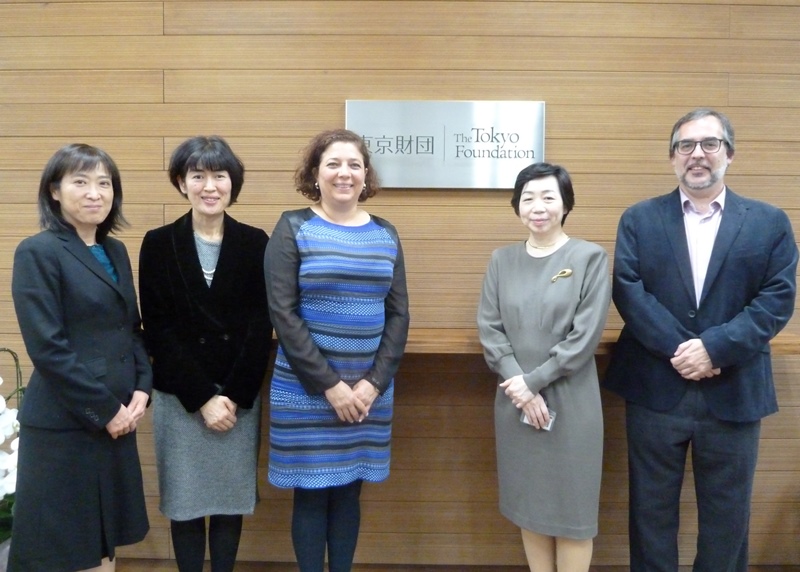
Colmex President Silvia Giorguli, center, and Professor Amaury García Rodríguez, far right, with members of the Sylff Association secretariat.
President Giorguli has advised and nurtured many Sylff fellows over the years as professor and director of the Colmex Center for Demographic, Urban, and Environmental Studies. Professor García Rodríguez, meanwhile, is the director of the Center for Asian and African Studies at Colmex. His research focus is Japanese art history, especially ukiyo-e.
The visit was a good opportunity to discuss how the donations to the Sylff Colmex Earthquake Relief Fund would be used. https://www.sylff.org/support_programs/sylff-colmex-earthquake-relief-fund/
This was the first visit by the president of a Sylff institution to our new office in Roppongi. Sylff fellows and steering committee members are always welcome to stop by the Foundation’s office when visiting Tokyo. Please let us know in advance if you have plans to come to Tokyo!

December 14, 2017
The Tokyo Foundation was pleased to receive a visit on November 17 from Adriana Rojas Martinez, a 2000 Sylff fellowship recipient at El Colegio de Mexico (Colmex).
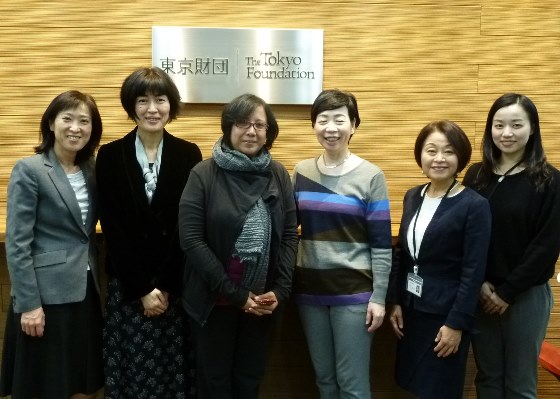
Adriana Rojas Martinez, center, with members of the Sylff Association secretariat.
Adriana completed her master’s studies at Colmex and is currently director of international development for the Asia-Pacific region at the Monterrey Institute of Technology and Higher Education (Tecnológico de Monterrey), the highest-ranking private university in Mexico
Her research focused on Japanese culture, and her master’s thesis was on Japanese manga. She visited Japan for the first time in 2000 with Sylff’s support, and her fascination with Japan has continued since then. She has taught classes on Asian culture and is now working to promote student exchange between Mexico and Asia, particularly Japan and China.

December 12, 2017
A Sylff Leadership Initiatives event was organized in Hungary in September 2017 to look to the future of the country and underline the importance of the role of civil society. A group of Hungarian Sylff fellows organized the event, held on September 8 and 9, combining a forum for academic discussion and analysis and on-site visits to areas outside Budapest. The title of the event was “Own Fate: Self-Managing the Future,” focusing on the role of bottom-up local initiatives in promoting Hungary’s sustainable economic development. A report of the event will soon be published on the Sylff website.
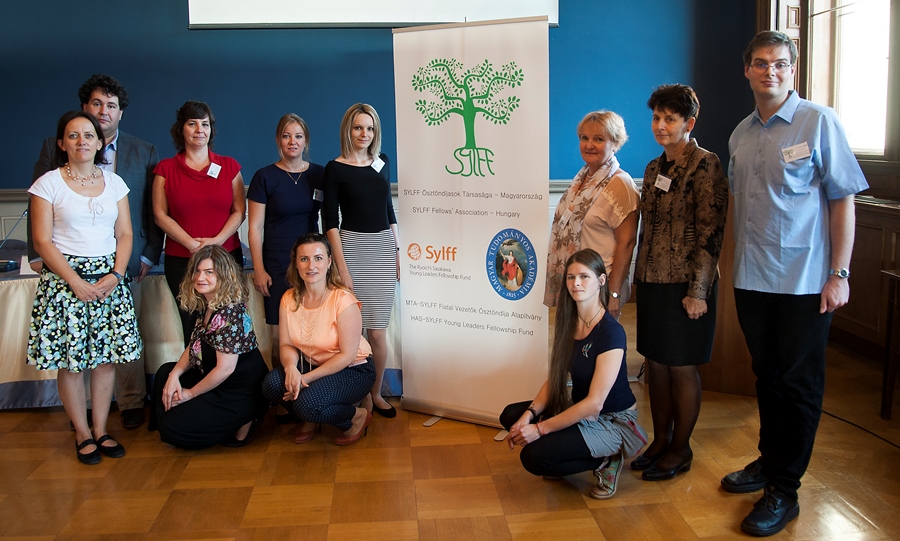
Members of the Hungarian Sylff Association with Mariann Tarnoczy (standing to the right of the banner) and Evelyn Kutari (standing to the left).
A member of the Sylff Association secretariat read a message from Association Chairman Yohei Sasakawa, who noted that the Sylff mission is to nurture young leaders with the ability and enthusiasm to address local and global issues from a broad perspective.
Hungary was one of the first countries in Central Europe to join the Sylff community, with the Hungarian Academy of Sciences being endowed in 1989. It was a time when the transition to democracy was gaining momentum in the region, and Hungary played a leading role in this movement.
Thirty years have passed since then. Hungarian society has undergone sweeping social and political changes, and the economy has achieved remarkable growth. The forum examined ways to make fuller use of the resources and skills of civil society in pursuing sustainable development in the future. The forum and on-site visits were well attended and marked by lively debate.
The event also presented an opportunity for Hungarian Sylff fellows from the past three decades—many of whom have become faculty members at Hungarian universities—to reunite, exchange views, and learn from each other. Sylff fellows from other universities were invited to attend as well, including a Sussex fellow who originally hails from Serbia. One of the main organizers, in fact, was Loretta Huszak, who received a Sylff fellowship while attending the University of Leipzig.
We were pleased to see Sylff taking firm root in Hungary, and it will no doubt grow even further in the future, as symbolized by the ceremonious planting of a “Sylff tree” by members of Hungarian Sylff association in a park participants visited on the second day.
Behind each successful Sylff program is a key Sylff steering committee member, and in Hungary’s case, it was Mariann Tarnoczy, who has been working with Sylff at the Hungarian Academy of Sciences since the program’s inception. We were very sorry to hear of her plans to step down in October, but during the event, a heartwarming ceremony was held in appreciation of her longstanding contributions to the program. The Sylff Association secretariat expresses its deep gratitude to her and welcomes Evelyn Kutari as her successor.
December 1, 2017

November 22, 2017
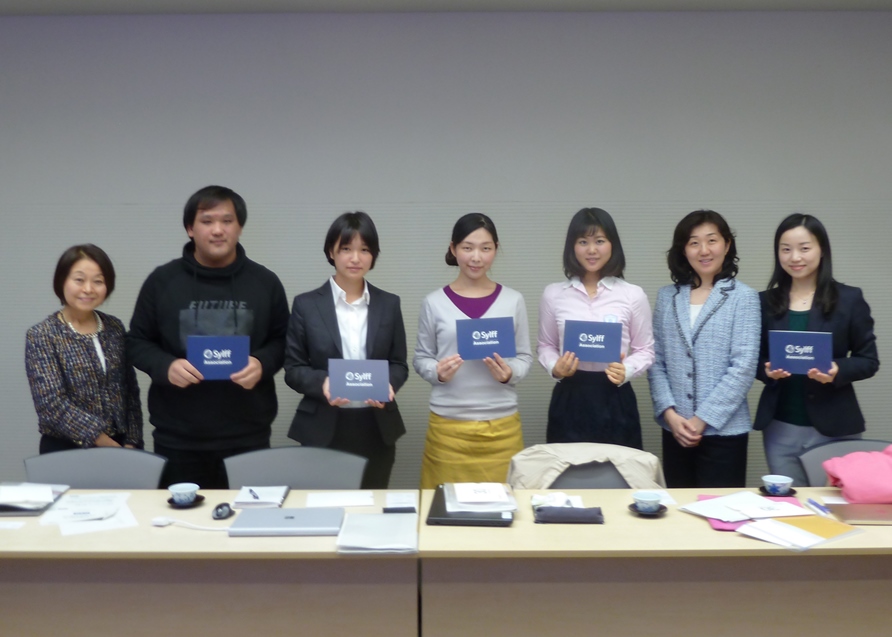
Taro Ueno, second from left, Yuri Kato, Yoko Matsuki, and Anna Nakamura with Sylff Association secretariat members.
On October 18, three members of Sylff Association secretariat visited the Graduate School of Media and Governance at the Shonan Fujisawa Campus (SFC) of Keio University—located some 50 kilometers southwest of central Tokyo—to meet with Sylff fellows and Sylff steering committee Chairman Jun Murai. Professor Murai was appointed SSC chair and dean of the Graduate School of Media and Governance in October.
The mission of the Graduate School of Media and Governance, which was established in 1994, “is exactly the same as that of Sylff,” said Professor Murai. “To resolve the increasingly complex problems confronting global society, we need an interdisciplinary approach transcending traditional research areas. This is why we’ve designed our curricula and programs to support students hoping to conduct research spanning several disciplines.”
Four graduate students were awarded Sylff fellowships in 2017: first-year master’s students Yuri Kato (architectural design), Yoko Matsuki (sociolinguistics), and Taro Ueno (cognitive science), along with first-year doctoral student Anna Nakamura (health science). In their presentations of their current research, they emphasized their strong hope of being able to help people and contribute to society not only locally but also globally.
All four fellows had very strong presentation skills, a result, no doubt, of their broad, interdisciplinary perspectives. We hope that they will take full advantage of the Sylff network and the various support programs provided by Sylff Association to further expand their knowledge and develop their leadership skills.
November 21, 2017

November 16, 2017
By 23904
Arno Trültzsch is a Sylff fellow from the University of Leipzig. He is working on a dissertation to explore the former Yugoslavia’s non-alignment policy and movement and its impact on international norms, including international laws and major UN resolutions for humanitarian and peace-building efforts, between 1948 and 1980. In this article, Trültzsch discusses the essence of his findings and arguments.
***
The title of my PhD project, “Non-Alignment Revisited: Yugoslavia’s Impact on International Law 1948–1980,” already indicates that the project is set on the crossroads of different disciplines and methods: global and local (i.e., Southeast European) history, international law, international relations, and intellectual history. My starting point was the rather well-known fact that, after its dismissal from the socialist camp in 1948, Yugoslavia became one of the instigators, main drivers, and pioneers of the so-called Non-Aligned Movement. Research on this global phenomenon of the second half of the twentieth century is still scarce and scattered along single issues, such as decolonization, economic history, and postcolonial topics. General accounts of non-alignment are either contemporary assessments from the 1960s to 1980s or standout research endeavors done in recent years.[1]
I want to contribute to this strain of research with a study of Yugoslavia’s role and impact on international law through its non-aligned policies. I therefore focus on the historicity of international law and its doctrines as expressions of specific social and political contexts, tied together by the discipline’s normativity and claim to provide a universal set of rules to international problems. I have drawn on important thinkers like Martti Koskenniemi, Bhupinder Chimni, and Hersch Lauterpacht. I also address (early) Marxist and Soviet theories of international law, as both are crucial for understanding the Yugoslav socialist perspective on international affairs and their law.
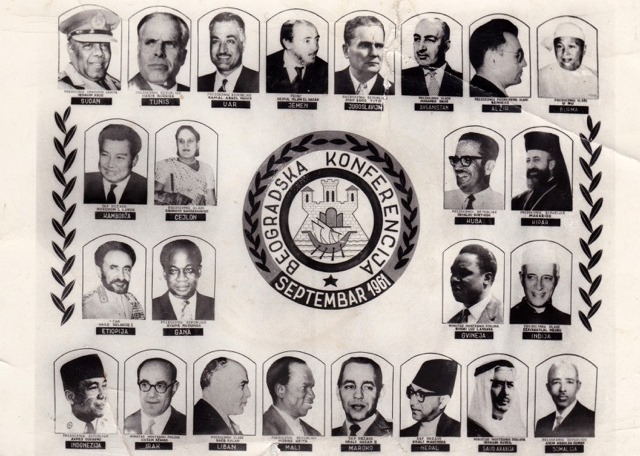
Commemorative poster for the first conference of non-aligned states held in Belgrade in 1961. Josip Broz Tito is fourth from right on the top row.
The Non-Aligned Movement first started as a loose dialogue platform and public forum of diverse smaller countries, especially former colonies from the Global South (Africa, Asia, and later also Latin America), who wanted to raise their voices against global inequalities and injustices and the ongoing nuclear arms race in the Cold War. Hence the name “non-alignment,” coined by India’s first prime minister, Jawaharlal Nehru, to describe the country’s independent foreign policy outside the forming camps of the northern hemisphere—the United States and its allies versus Soviet Union and its satellites.
After 1948, Yugoslavia was mostly isolated in a divided Europe, so the Yugoslavs looked for new allies, which they found among former colonies and mandate territories that had just gained their independence. During the 1950s and 1960s, therefore, Yugoslavian President Josip Broz Tito engaged in lengthy travels around the globe to build personal alliances with the leaders of these “new” countries. Tito’s personal diplomacy was widely publicized and praised, gaining Yugoslavia worldwide prestige. After an overture in 1956, during which he built a personal alliance with Prime Minister Nehru of India and President Nasser of Egypt, the first conference of the non-aligned countries was held in Yugoslavia’s capital of Belgrade in 1961.
Besides this high-level public diplomacy, Yugoslavia sought to strengthen the United Nations’ system for solving international conflicts, particularly through binding norms of international law, mostly to secure its delicate position in a divided Europe and globe. To that end, Yugoslav protagonists initiated an increasing number of draft resolutions within the organs of the United Nations, together with their new non-aligned partners—especially India and Egypt. Although many of these moves were connected with the complexities of Yugoslav foreign policy, they deserve thorough analysis and reassessment.
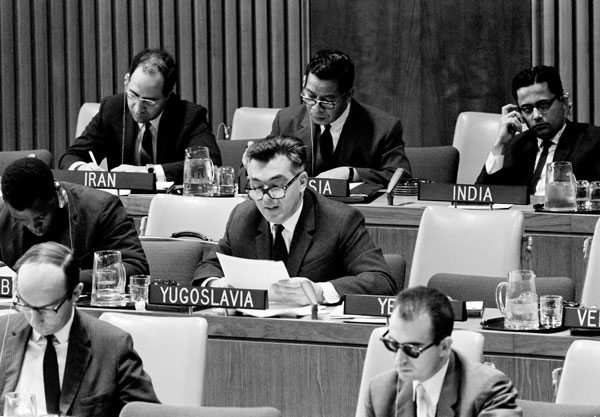
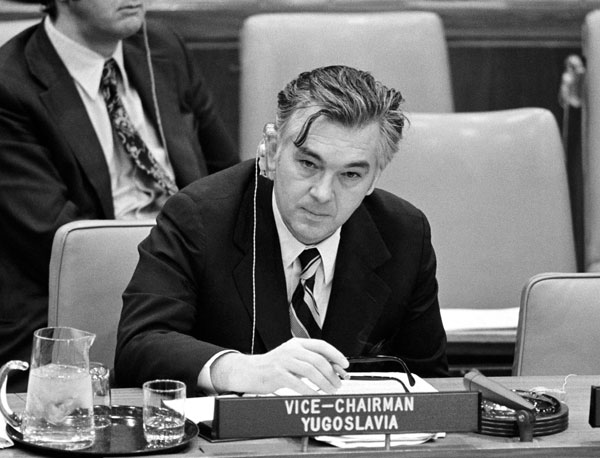 Milan Šahović, a legal expert of the Yugoslav delegation, speaking at the Fifth and Sixth Committees on legal matters of the UN General Assembly.
Milan Šahović, a legal expert of the Yugoslav delegation, speaking at the Fifth and Sixth Committees on legal matters of the UN General Assembly.
I am about to explore and question whether these initiatives contributed to an increasing legal certainty in international affairs and how they fitted Yugoslav foreign policy interests, especially in the controversial fields of human rights, peace and security, state responsibility, and disarmament. All these issues were discussed and redefined in the course of the Cold War, during which the non-aligned sought to be a “third” option of independent but cooperating countries outside the political camps and military alliances epitomized by the Warsaw Pact and the North Atlantic Treaty Organization.
In this vein, I am examining and evaluating specific Yugoslav approaches to and interpretations of international law, focusing on the triad of political actors, legal experts, and diplomacy. I combine this actor-based approach with the analysis of foreign policy documents—especially diplomatic correspondence and political reports between Belgrade and the UN delegations—and the critical examination of Yugoslav publications on international law. Another group of important sources are Yugoslav textbooks and studies dealing with different aspects and doctrines of international law and the UN system.
Likewise, a set of ideological and political treatises on non-alignment and Yugoslav socialism have caught my attention, as I try to highlight the connection between Yugoslav socialist ideology, legal expertise, and foreign policy initiatives in the United Nations. After 1948, Yugoslavia remained a socialist country (much to the surprise of the West) but outside the Soviet camp, soon developing a particular socioeconomic system and variant of Marxist ideology called “worker’s self-management,” which Yugoslav foreign policy even tried to popularize in some non-aligned developing countries, though to little avail.
Many of the pushes for a further juridification[2] of international relations did not necessarily result in so-called “hard” or codified international law. But I argue that these ideas still had a wider impact both on Yugoslavia’s international and self-image, especially in legitimating the authoritarian rule of its leader Josip Broz Tito and the League of Communists (the ruling party), and on the inner dynamics of the Non-Aligned Movement until the early 1980s. In my further research and writing process, I want to delineate whether these “image politics” were the primary purpose of Yugoslavia’s UN activities, or if they really had a tangible impact on international law.
I have therefore analyzed archive materials from the Serbian Ministry of Foreign Affairs (which still keeps the Yugoslav records) and the Historical Archives of Yugoslavia, both of which are in Belgrade, for the period from 1948 to 1980. In the textbooks and in the archive files, I was able to specify a number of significant UN initiatives and their wider impact. Among these are important contributions for defining acts of aggression against other states that resulted in General Assembly Resolution 3314 (XXIX) in 1974 and the codification and elaboration of diplomatic and consular intercourse, leading to the 1964 Vienna Convention on Diplomatic Law. Furthermore, Yugoslavia helped establish a general Magna Carta of international legal conduct in line with the political doctrine of “active peaceful coexistence”: the Friendly Relations Declaration of 1970, or Resolution 2625 (XXV). Likewise significant are Yugoslav drafts on counterterrorism measures (specifically, aircraft hijacking and protection of diplomats), leading to important conventions in 1972 and 1973.
Drawing on legal language, while seeking political solutions, Yugoslav UN diplomats and law experts repeatedly requested serious steps on disarmament, calling for a halt to the nuclear arms race, and supported the decolonization process as well as providing direct support for various postcolonial liberation movements, such as those in Algeria, Palestine, and South Africa. These actions led to the criminalization of apartheid and racism under the International Convention on the Elimination of All Forms of Racial Discrimination (adopted in 1965, entered into force in 1969) and the Convention on the Suppression and Punishment of the Crime of Apartheid (1973 and 1976). In the disarmament debate, meanwhile, only single issues could be tackled, and Yugoslav experts codrafted the conventions on prohibiting biological and chemical weapons. The former was opened for signature in 1972 and entered into force in 1975, while the latter reached these milestones in 1992 and 1993, respectively.
On the European scale, Yugoslav politicians, together with their colleagues from neutral Finland and Austria, mediated between the power blocs to establish a dialogue on peace, disarmament, and civil rights—the Conference on Security and Cooperation in Europe (CSCE). Belgrade was the host city of the second summit in 1977. The Yugoslav drafts on national minority protection were incorporated into the CSCE framework and are still valid for the CSCE’s successor organization, the Organization for Security and Cooperation in Europe (OSCE). Minority rights were also an important field of action in the United Nations, but without the impact that Yugoslav proposals and concepts had on a European scale. Altogether, the country’s openness and affirmation of human rights stood in contrast to the country’s record at home; human rights were nominally intact but were focused on social and workers’ rights, and Yugoslav citizens could not enjoy the civil rights and freedoms that their country had officially recognized on an international scale.
While Yugoslavia is today remembered largely for the wars that resulted from the country’s dissolution eventually into seven states (if one counts Kosovo), which led to new legal problems on an international scale, the contribution of this socialist, non-aligned country to international matters and their law is largely forgotten—often even inside the successor states. I am about to change that, pending the completion of my dissertation (in German) hopefully by next year.
For general information on and English abstracts and presentations by the author, see: https://uni-leipzig.academia.edu/ArnoTrultzsch
Trültzsch, Arno. “Blockfreiheit und Sozialismus: der Beitrag Jugoslawiens zur Völkerrechtsentwicklung nach 1945.” Die Friedens-Warte: Journal of International Peace and Organization 90, no. 1/2 (December 2015): 161–88. (in German)
———. “Völkerrecht und Sozialismus: Sowjetische versus jugoslawische Perspektiven.” In Leipziger Zugänge zur rechtlichen, politischen und kulturellen Verflechtungsgeschichte Ostmitteleuropas, edited by Dietmar Müller and Adamantios Skordos, 1st ed., 83–104. Leipzig: Leipziger Universitätsverlag, 2014. (in German)
Arnold, Guy. The A to Z of the Non-Aligned Movement and Third World. Lanham: Scarecrow Press, 2010.
Kilibarda, Konstantin. “Non-Aligned Geographies in the Balkans: Space, Race and Image in the Construction of New ‘European’ Foreign Policies.” In Security Beyond the Discipline: Emerging Dialogues on Global Politics—Selected Proceedings of the Sixteenth Annual Conference of the York Centre for International and Security Studies, 27–57. York: York Centre for International and Security Studies, York University, 2010.
Kullaa, Rinna. Non-Alignment and Its Origins in Cold War Europe: Yugoslavia, Finland and the Soviet Challenge. London: I.B. Tauris, 2012.
Mišković, Nataša, Harald Fischer-Tiné, and Nada Boškovska, eds. The Non-Aligned Movement and the Cold War: Delhi–Bandung–Belgrade. London, New York: Routledge, 2014.
[1] Significant recent publications on the general history of the Non-Aligned are: Jürgen Dinkel, Die Bewegung Bündnisfreier Staaten: Genese, Organisation und Politik (1927–1992), first ed. (München: DeGruyter Oldenbourg, 2015) (in German); Nataša Mišković, Harald Fischer-Tiné, and Nada Boškovska, eds., The Non-Aligned Movement and the Cold War: Delhi–Bandung–Belgrade (London, New York: Routledge, 2014); Guy Arnold, The A to Z of the Non-Aligned Movement and Third World (Lanham: Scarecrow Press, 2010); and, with a focus on Finland and Yugoslavia during the 1950s, Rinna Kullaa, Non-Alignment and Its Origins in Cold War Europe: Yugoslavia, Finland and the Soviet Challenge (London: I.B. Tauris, 2012).
[2] Juridification: turning moral ideas and political demands into written law; a wider term for codification, which more narrowly describes the written consolidation of laws that have formed out of custom or sheer practice, particularly in international affairs between two or more states.

